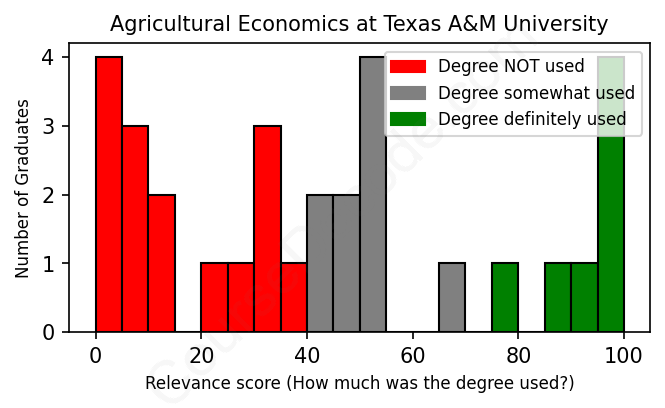
First, some facts. Of the Agricultural Economics graduates from Texas A&M University we've analyzed , here's how many have used (or NOT used) their degree in their career:

These are estimates based on AI analysis of 31 LinkedIn profiles (see below).
The verdict? Bad. Overall, with an average relevance score of 42%, Agricultural Economics graduates from Texas A&M University have a substantially lower likelihood (-25%) of finding work in this field compared to the average graduate across all fields:
And for comparison, here's the chart for all profiles we've looked at across all degrees.
Also, after graduating, only 25% of these graduates have pursued further education other than another Bachelor's degree (such as a Masters degree or other), compared to the average across all profiles of 35%. This suggests a Bachelors degree is enough for most Agricultural Economics graduates, and it's normal to look for work straight after graduation.
See the details:
|
Relevance score: 49% We think this person has gone into a career only somewhat relevant to their degree. We think this person has gone into a career only somewhat relevant to their degree.
DEGREE INFOGraduated in 2011 from Texas A&M University with a Bachelor of Science in Agricultural Economics. No other secondary education since. JOB HISTORY SINCE GRADUATIONQuality Control Coordinator Field Asset Services 2011 - 2011 Quality Control Coordinator  Field Asset Services Jun 2011 - Sep 2011 Financial Representative  Northwestern Mutual Jan 2012 - Present ABOUTAs a Northwestern Mutual Financial Network Representative, Imatch your needs with innovative solutions utilizing world-class insurance services and internationally recognized investment products, I will do my best to help you protect and provide for those people you care about most. I will work hard to build a relationship with you based on trust and integrity, always striving to provide you with the same level of ethical service that I would expect for myself. |
The top 10 most common jobs done by the graduates we've analyzed (ranked most common to least) are:
When looking at the career paths of people who graduated with a degree in Agricultural Economics from Texas A&M University, it’s clear that there’s a mixed bag of job types. Many graduates have landed in roles like sales representatives, banking positions, and administrative jobs that often don’t directly apply the specific skills or knowledge from their studies. For instance, while positions such as Claims Adjuster or Bank Teller might benefit from some general economic understanding, they largely focus on customer service or operational tasks and do not require a deep understanding of agricultural economics principles.
However, there are also notable exceptions. Some graduates actually enter fields that utilize their degree more directly, like those working as Investment Consultants, Financial Analysts, or even those who took roles in agricultural businesses where supply chain and market knowledge are critical. Jobs like Director of Operations at agricultural firms or roles that involve economic forecasting show a solid connection to the skills learned during their studies. So, while many end up in roles that may seem unrelated at first glance, a good number of Texas A&M’s Agricultural Economics graduates have carved out careers that align more closely with their degree. It’s kind of like having a toolbox: some tools get used more often than others, but the fundamental learning can apply to different situations in unexpected ways!
Here is a visual representation of the most common words in job titles for Agricultural Economics graduates (this is across all Agricultural Economics graduates we've analyzed, not just those who went to Texas A&M University):

Graduates from Texas A&M University's Agricultural Economics program seem to have taken a pretty versatile path when it comes to their careers. Right after graduation, many of them land roles that are somewhat related to their field, like sales positions, financial analysis, and operational roles in various companies. For instance, graduates often start as sales representatives or in roles like claims adjusters or purchasing managers—jobs that utilize their knowledge in economics but might not be straight-up in agriculture. It seems like these early jobs allow them to build valuable skills in sales, finance, and management, which can open doors to a variety of sectors.
Fast forward 5 to 10 years, and many of these graduates are moving into more established roles, still within a mix of industries. Some have made their way into higher management, like directors or operations managers, often within the companies they started with or similar fields, indicating they’ve gained valuable experience and climbed the corporate ladder. However, there are also cases where they end up in positions that are quite distant from agricultural economics, like becoming an attorney or a bank teller. While it's great to see some people thriving in relevant roles like financial consultants or project managers connected to ag-related businesses, there's also a fair number who seem to have drifted into unrelated fields. So, while there are definitely success stories directly tied to Agricultural Economics, it’s clear that the degree offers flexibility that can lead to varied career paths—both good and not-so-good.
Honestly, a Bachelor’s degree in Agricultural Economics at Texas A&M can be a bit of a mixed bag. It’s not the easiest degree out there, but it's definitely manageable if you keep up with your studies and stay organized. You’ll dive into topics like economics, statistics, and resource management, which can get pretty challenging if you’re not into those subjects. That said, a lot of students find the coursework interesting and relevant, especially if they have a passion for agriculture or business. So, if you’re willing to put in the effort and stay on top of things, you should be just fine!
Most commonly, in the LinkedIn profiles we've looked at, it takes people 4 years to finish a Bachelor degree in Agricultural Economics.
Looking at these Agricultural Economics graduates from Texas A&M and their job histories, it seems like most of them are doing pretty well financially, though there are some variations. For example, those working in sales and management roles, especially in the oil and gas sector or real estate, often snag solid paychecks, indicating that their earnings might be decent to high. Meanwhile, some positions, like customer service or entry-level roles, while good starting points, might not offer the same financial perks. Overall, it appears that a lot of these grads have landed in jobs with potential for good income growth, especially if they stick with it and climb the career ladder.
Here is a visual representation of the most common words seen in the "about" section of LinkedIn profiles who have a Bachelor degree in Agricultural Economics (this is across all Agricultural Economics graduates we've analyzed, not just those who went to Texas A&M University). This may or may not be useful:

Here are all colleges offering a Bachelor degree in Agricultural Economics (ordered by the average relevance score of their Agricultural Economics graduates, best to worst) where we have analyzed at least 10 of their graduates:
| College | Score | Count |
|---|---|---|
 Texas A&M University Texas A&M University
|
42 | 31 |
 Texas Tech University Texas Tech University
|
39 | 13 |